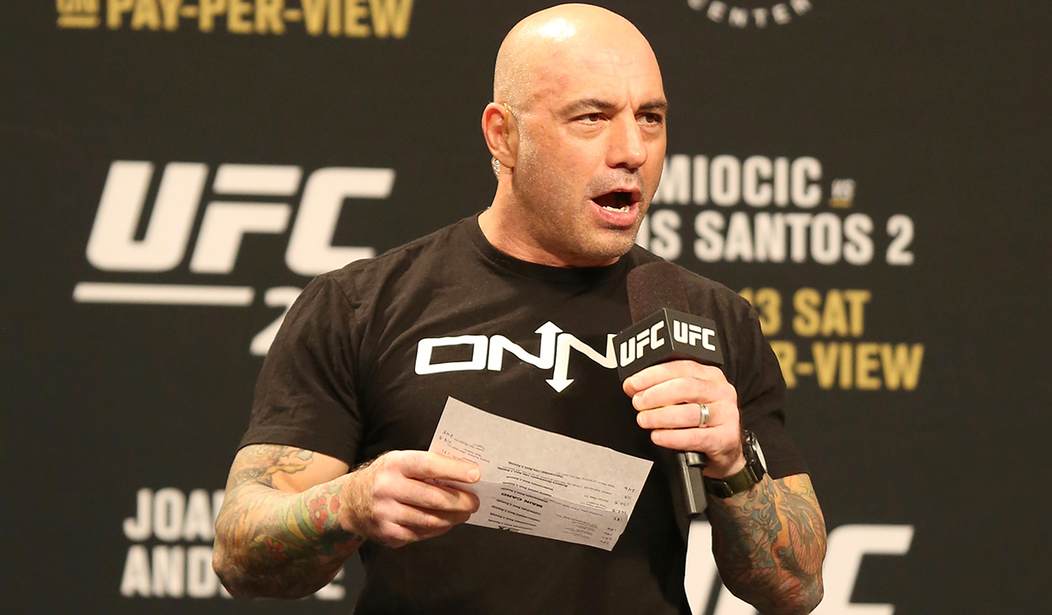I’ve never seen a major media organization react this way after being caught in a falsehood.
It’s not even “fake but accurate.” It’s “fake but he had it coming.”
Erik Wemple of WaPo went through the network’s archives and found no less than six instances of CNN staff implying that Joe Rogan had taken the livestock version of ivermectin after he came down with COVID. Five of those six were anchors, journalists by trade with a duty to report facts accurately. Some Americans really have resorted to taking ivermectin for animals in their desperation to get hold of the drug but Rogan has said from the start that he was prescribed the version for human beings by a doctor. So why did CNN jump to the conclusion that he was squeezing horse paste into his mouth?
Rogan confronted CNN contributor Sanjay Gupta about it when Gupta was a guest on his podcast recently:
Joe Rogan asks Sanjay Gupta if it bothers him that CNN outright lied about Rogan taking horse dewormer to recover from covid. This is fantastic: pic.twitter.com/PEgJqIXhSD
— Clay Travis (@ClayTravis) October 14, 2021
Gupta admitted that his network shouldn’t have misrepresented Rogan’s treatment, the most basic concession an employee of a news organization can make when they’re caught having gotten something wrong. When Wemple contacted CNN’s PR department for comment expecting a similar mea culpa, though, he got a surprise. CNN wasn’t as conciliatory as Gupta was. To the contrary:
The heart of this debate has been purposely confused and ultimately lost. It’s never been about livestock versus human dosage of Ivermectin. The issue is that a powerful voice in the media, who by example and through his platform, sowed doubt in the proven and approved science of vaccines while promoting the use of an unproven treatment for covid-19 — a drug developed to ward off parasites in farm animals. The only thing CNN did wrong here was bruise the ego of a popular podcaster who pushed dangerous conspiracy theories and risked the lives of millions of people in doing so.
What?
The “heart of this debate” is whether CNN has an ethical obligation to the truth. According to Rogan, they got something wrong; worse, they seem to have gotten it wrong because they found the “vaccine skeptic taking animal medication” storyline too good to check. Last week I wrote this in speculating about why Gupta didn’t pressure CNN internally to correct the record about Rogan:
The likely truth: Gupta didn’t make an issue of the false report about Rogan inside CNN because he feared that correcting it would do more harm than good. He’s worried that people are taking ivermectin, an unproven treatment, in lieu of getting vaccinated; the reports about “horse dewormer” make the treatment sound nuttier than it is, steering the public away from it. In Gupta’s heart of hearts, I bet he thinks CNN’s fake news about Rogan was a “noble lie” not unlike Fauci claiming at the start of the pandemic that masking doesn’t work because he wanted to preserve the existing supply of masks for medical professionals. It’s untrue, but it was thought to serve the greater good.
Isn’t that what CNN’s statement to Wemple amounts to? They told a noble lie to make a guy who prefers alternative treatments to vaccination look like more of a crank than he is, hoping that the resulting mockery would steer undecided viewers away from ivermectin and towards the vaccine. “CNN’s statement sounds more like the work of an advocacy group than a journalism outfit,” Wemple remarked with understatement.
If you take the network’s logic seriously, they’re claiming a license to lie in their coverage so long as doing so might lead to better social outcomes. If it’s okay to falsely accuse Rogan of taking a certain drug in order to marginalize him, presumably it’s okay to tell other falsehoods with the same purpose so long as they fall short of actionable defamation. Frankly, Wemple may be doing a disservice to advocacy groups in comparing them to CNN since even most (many?) activists wouldn’t condone outright lies about their opponents’ behavior.
I wonder how much of the network’s reaction here is a product of a general “advocacy trumps facts” culture and how much of it is specific to encouraging vaccination. (CNN has been known to create exceptions to journalistic ethics for coverage related to the pandemic.) They might be especially defensive about their reporting on the vaccines because they view themselves, not incorrectly, as participants in an information war with amoral anti-vax propagandists on the other side. But that’s the COVID version of the media’s recurring dilemma with Trump. Once they conclude that they’re facing a special threat with a bottomless willingness to deceive, they seem more willing to break their own ethical rules to defeat it. Which is not only indefensible, but it plays into the hands of their opponent by discouraging trust in mainstream news organizations.
And so we end up with a corporate media PR department whining about Joe Rogan’s bruised ego when asked why virtually every big-name anchor on their network got a basic fact wrong about him.
Exit question: By CNN’s logic, shouldn’t it start reporting that Trump got a booster shot and heartily recommends it to all? Shouldn’t it report that Ron DeSantis has reversed himself on mandates and now supports Joe Biden’s policy requiring all workers at large companies to get their shots? Those are both lies, but if it’s okay to tell one lie to encourage vaccination, why shouldn’t it be okay to tell others?







Join the conversation as a VIP Member